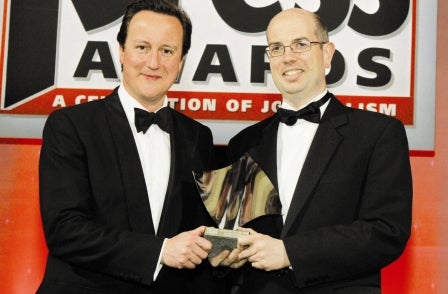
The High Court has thrown out a privacy action against the Evening Standard which centred on the baseless claim that journalist Andrew Gilligan hacked the emails of a businessman.
Mr Justice Tugendhat ruled that a former business associate of Lord Coe, Peter Abbey, was guilty of “extortion” for alleging that Gilligan hacked his emails – and he ruled that Gilligan’s reporting was in the public interest.
He also said that Abbey used the CFA (no win, no fee) system to argue that the Standard should settle his £100,000 damages claim on purely economic grounds because it would be cheaper for them than fighting it.
The claim stems from a story that appeared in the Evening Standard in September 2007 when it was owned by Associated Newspapers.
Gilligan reported that the company set up to control Lord Coe’s business interests, Complete Leisure Group, appeared to be in trouble. CLG was set up in the weeks after London won the Olympic bid in 2005 to invest in “media and leisure opportunities”.
It quoted from an email sent by one of the company’s directors, Peter Miller, to Lord Coe and the litigant Peter Abbey in which he said he was being threatened with legal action because the company had failed to file its accounts.
Abbey, who is a tax exile and former bankrupt, said in another email to an investor in the company in 2007 (also quoted by Gilligan):
“I am not hiding anything… The money, along with another 400,000 was pissed away… and if you want to come in and see me, I will tell you chapter and verse… I am not happy having this in writing for obvious reasons…this is about the worst situation I have had to deal with and we are trying to solve it quietly. DO NOT circulate this PLEASE!!!”
Abbey alleged in a legal claim filed last year that Gilligan illegally obtained the emails, that he was guilty of hacking.
Today’s judgment states that the emails were sent to Gilligan by another journalist, Ed Howker, who had obtained them while working as assistant producer on a Channel 4 Dispatches documentary called “The Olympic Cash Machine”.
The programme was broadcast on 10 September, four days before the Gilligan article appeared.
Howker and Gilligan have declined to reveal the original sources of the emails – “as is their right”, Tugendhat notes.
Abbey’s claim is for breach of confidence and that the emails were taken or copied without his consent.
Associated Newspapers argued that publication was in the public interest because it “corrected a false picture put out in statements by Lord Coe” and “contributed to a debate of general public importance”.
In a judgment which is being seen by both the Standard and Associated as a significant victory for press freedom, Tugendhat says: “Where a person assumes a role of national importance, as Lord Coe did, and it is a role which requires a clear separation between it and his private business interests, then the public has an interest in knowing to whom he has entrusted matters relating to his private business interests.”
He added: “I have no doubt that Lord Coe’s decision to entrust matters to Mr Abbey in 2007 did call into question his own private and professional judgment.”

Tugenhat noted: “I make no finding as to whether or not the [Dispatches] programme or the Article contributed to Lord Coe’s decision to take matters in hand as he did. But it was not apparent at the time the Article was published that he had done so, and the public interest must be judged.”
In parts of the judgment, Tungendhat was stinging in his criticism of Abbey, who sued and made the hacking claims against the Standard four years after the event at a time when hacking was very much in the news.
He said: “What is troubling here is that Mr Abbey repeatedly alleged that the defendants had committed criminal offences which are serious, and which were of the kind which had led to the demise of the News of the World (followed by reports of payments of very large sums of money to persons whose phones had been hacked), but in circumstances where there was no evidence to support those allegations.
”The fact he never did report the matter to the police supports the inference I draw that he made the threats for the purpose of obtaining a settlement on terms which he did not expect to achieve on the merits of his claim for breach of confidence.
“I find that this was an attempt at extortion, and that it was an abuse of the process of the court to attempt to obtain settlement of this claim by that means.”
On his use of the CFA system in order to try to force a settlement, the judge said: “This is an example of a claim funded by a CFA which, as a result, put the defendants in a position where there was a strong economic incentive to them to settle the claim, even if they took the view, as they appear to have done, that it was wholly without merit.
“There is no doubt that in correspondence the solicitors for Mr Abbey invited them to settle for economic reasons on terms more favourable than the merits of the claim justified.”
In his conclusion the judge said: “The publication complained of was in the public interest.”
- Press Gazette is now available on Google Currents. Currents is a social reading app that allows you to subscribe to a variety of publications and read a selection of their output online or offline. If you’re accessing this on an iPhone, iPad or Android phone or tablet, you can get Press Gazette on Currents here. Give it a try and let us know what you think.
Email pged@pressgazette.co.uk to point out mistakes, provide story tips or send in a letter for publication on our "Letters Page" blog
